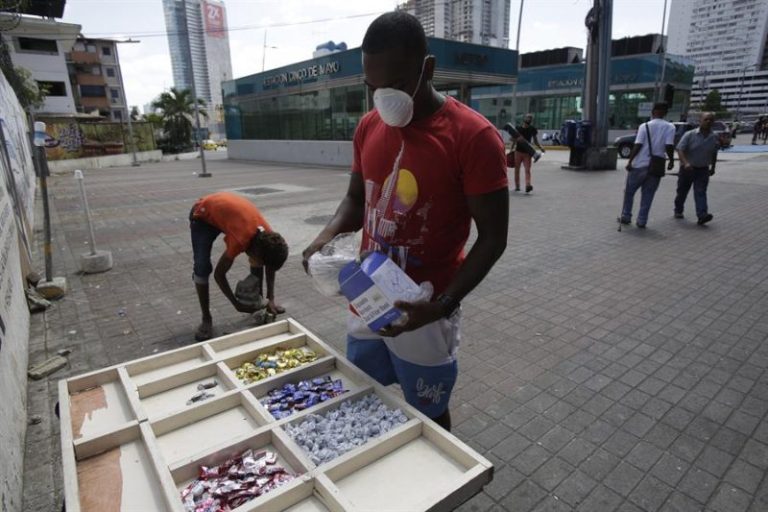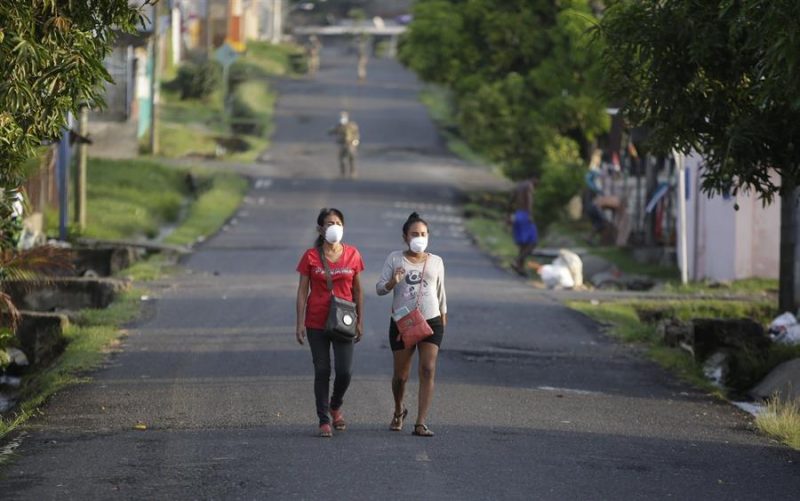13 de mayo 2020

Children of Exile: The Births “Sowing Hope” in the Camp of Nicaraguan Farmers

PUBLICIDAD 1M
PUBLICIDAD 4D
PUBLICIDAD 5D
Daniel Ortega’s Government continues to ignore their request during the Covid-19 pandemic; another 160 wait in the Cayman Island and 44 in El Salvador

The Government of Daniel Ortega is not doing anything for more than 200 Nicaraguans who are stranded in Panama and want to return to their homeland
On August 4, Jessica Romero will complete one year of living in Panama. She is resigned to reach it, because the Government of Daniel Ortega is not doing anything for more than 200 Nicaraguans who are stranded in the Canal country and who plead to return to their homeland in the face of the worldwide pandemic of Covid-19.
This 27-year-old woman left for Panama nine months ago to seek a better life. “My family is quite poor and this was the only way I found to make money,” she explains. She made 600 dollars a month working as a babysitter. Of that money, she sent between 100 to 200 dollars, to help her family.
However, in the midst of the coronavirus pandemic, from one day to the next, her bosses told her that “they no longer needed” her services. They fired her and did not pay her any severance. “They threw me out on the street without a penny and that’s why I couldn’t go back to Nicaragua,” she explains.
She worked as a sleep-in maid, but they did not even let her stay at home. She went to the Panamanian institutions to file a complaint, but they dragged their feet on the issue and then closed it with the quarantine decree. “That will be resolved after this goes away,” they told her.
A Puerto Rican woman is giving her a place to stay. But she does not have money to eat. She spent all her savings and survives on money sent by her family in Nicaragua. “They are poor. My mother sells clothes, and whenever she can she sends me money, because she does not have a lot,” she insists.
“It is terrible to be alone in a foreign country and not even have anything to eat. Sometimes once and at most twice a day when you can,” she states.
Jessica’s feeling every day is one of despair. She would have rather been able to go back when she could. “But without money, I couldn’t take a bus and leave,” she says.
Since the end of April, the Nicaraguan Migration and Immigration authorities have closed the borders to migrants from El Salvador, the Cayman Islands and Panama. Forty-eight Nicaraguans who reached Honduras had to cross the border through non-authorized entry points.
Currently, at least 200 Nicaraguans are stranded in Panama, 160 in the Cayman Islands and 44 in El Salvador.
“It’s unjust that they don’t let us return to our homeland. In Nicaragua one survives anyway we can, but in a country as expensive as Panama, if I don’t die of coronavirus I could die of starvation,” says Arbenis Valdivia, who has lived in Panama for four years and has been out of a job for almost two months.
He has had to sell a television, a phone that he was to take to a relative on his return to Nicaragua and other electrical appliances in order to survive. “What we are experiencing is unjust, it is a humanitarian crisis that does not seem to arouse any compassion in the Government of Nicaragua,” he says.
“We are 200 Nicaraguans, many of them are children, pregnant women and old people. We have nothing to do with the sociopolitical crisis, almost all of us have been living in Panama for years. We left like any other Nicaraguan seeking to provide for our families, but we can no longer continue here because we cannot work,” explains Arbenis.
Panama reports 249 deaths and 8,616 Covid-19 infections, according to the latest report from health authorities on May 12th. It is the Central American country with most infections and with most deaths.
To date, after the first reported case, on March 9, a total of 39,093 tests have been carried out to detect the new coronavirus. 77% of them have been negative.

Panama is the country in the region with the highest number of infections and deaths from Covid-19. EFE / Confidencial
The Panamanian authorities emphasized this week that they continue to analyze the steps to gradually normalize the country, including the lifting of the indefinite national quarantine decreed on March 25 to mitigate the spread of the virus.
For the moment, they decided that Saturday and Sunday will be in total quarantine, as it has been in recent weeks.
Meanwhile, many of us are out of work and we don’t even have food to eat. No one is helping us, although we continue to make efforts to seek humanitarian aid,” insists Arbenis.
This man from Jinotega started talking to Nicaraguan friends who were experiencing a similar situation to his in Panama. “All of a sudden, we began to notice other friends, acquaintances and I organized a WhatsApp group in which we are 200 Nicaraguans suffering from unemployment, hunger and helplessness,” he explains.
However, he admits that daily they receive requests from more people who report that they are experiencing a similar situation.
On April 17, they contacted the Nicaraguan Ambassador in Panama, Marvin Ortega, to ask for his support, but he told them to buy their ticket, that they had no way to repatriate them. Days later, a group went to the Nicaraguan Embassy in Panama, but they found it closed, with notices of numbers to call in cases of emergency. “But no one answers, the government continues to ignore us,” he points out.
“We have more than fifty days of being locked up without the help of any organization. Several of us have expired visas, others have work permits, but there is nowhere to work,” bemoans Arbenis.
He made a living in a construction company but was left on the street because all construction is paralyzed. “In my case, the person that rents to me did not throw me out to the street, but I already owe him a month’s rent. It is hard to be without anything and subsisting while one can,” he says.
He explains that they are trying to open up a communication channel with Panamanian authorities, so that they can help them to negotiate their return to Nicaragua, although they have been hindered by the restriction that exists to mobilize.
Berman Rizo has worked for three years in Panama. He works in a private clinic as a watchman. He feels “somewhat lucky” because he is one of the few Nicaraguans who continues to work.
“I have not stopped working because clinics do not close, but since March 25 I have stayed at the company. Here I sleep, I do not go out at all,” he explains.
However, he would prefer to return to Nicaragua. He was scheduled to travel on March 31, but was unable to. “In my country I would feel safer because I want to be with my wife and daughter,” he said.
Many of his friends are out of work and they were even thrown out of the rooms they rented, despite the fact that the Panamanian Government has called for solidarity and not to throw anyone to the street.
“I am still renting a house and there are two more Nicaraguans: a young man from Boaco and another from Jinotega. I help them with food because I know the situation is critical for many Nicaraguans. What we are living is sad,” says Berman.
He mentions that many of those in the WhatsApp group write desperately every day because they have nothing to eat and want to return.
“If there were transportation from Panama City to “Paso Canoas,” near the border, I am sure that many Nicaraguans would leave. There are some who are desperate and even want to go in a caravan on foot,” he tells us.
He calls on the Government of Daniel Ortega to listen to them. “It depends on them if we starve, or let us return to our homeland,” he insists.
“We want to return to the homeland where we belong. This is not about politics. Although some left because of the sociopolitical problem Nicaragua is experiencing, many of us are lifelong migrants and we have no other alternative but ask for a humanitarian trip,” he says.
Furthermore, Berman affirms that everyone is willing to undergo a medical examination if they are allowed to return to Nicaragua. “We are not going to infect everyone with coronavirus. It has nothing to do with that. We are even willing to be isolated in a quarantine,” he says.
PUBLICIDAD 3M
Periodista nicaragüense, con dos décadas de trayectoria en medios escritos y digitales. Fue editor de las publicaciones Metro, La Brújula y Revista Niú. Ganador del Grand Prize Lorenzo Natali en Derechos Humanos.
PUBLICIDAD 3D